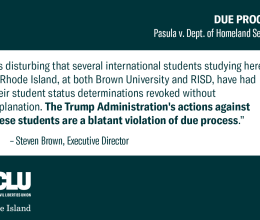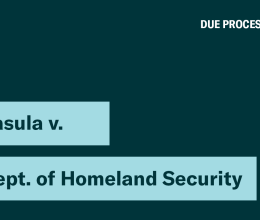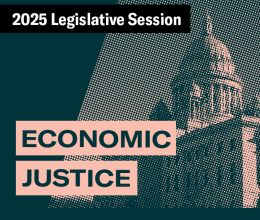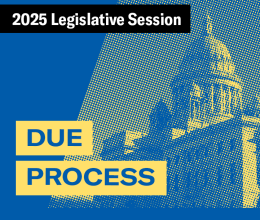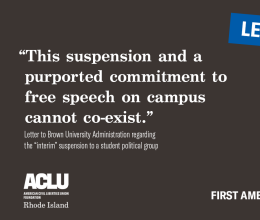The Rhode Island ACLU has filed a motion in federal court, seeking a declaration, without the need for a trial, that the Town of Narragansett’s highly-publicized “orange sticker” ordinance is unconstitutional. In a 22-page brief accompanying the motion for “summary judgment,” the ACLU also requests a permanent injunction against the Town, barring enforcement of the ordinance.
The ACLU filed suit last year against the ordinance, which authorizes police both to charge tenants and landlords for allowing “unruly gatherings,” and to place orange stickers on houses that have allegedly been the site of such gatherings. The lawsuit, filed by ACLU volunteer attorney H. Jefferson Melish, is on behalf of the URI Student Senate, as well as four students and three landlords who have been affected by enforcement of the ordinance.
The ACLU brief, filed yesterday, argues that the ordinance is unconstitutionally vague, by failing to “provide fair notice to students, tenants or landlords of what constitutes illegal behavior” and by not providing “appropriate guidance to the police to ensure non-discriminatory and non-arbitrary enforcement.”
The brief also claims that the ordinance violates the plaintiffs’ due process rights. It notes:
“The act of affixing a 10 inch by 14 inch orange sticker to the front door of a rental property is left to the sole discretion of the police with no opportunity for a hearing either before or after the posting of the orange sticker. Since the orange sticker can not be removed until the end of the school year without financial penalty, regardless of the presence or absence of the original ‘unruly’ tenants, its presence stigmatizes the reputations of the landlord and any and all tenants, and reduces the value of the property, in effect depriving the landlord of fair use of the property.”
RI ACLU attorney Melish said today: “The ordinance is clearly aimed at shaming students and landlords by branding their residences with large orange stickers, the town’s modern-day version of scarlet letters. We look forward to the Court's ruling on our constitutional challenge to this ill-conceived ordinance.”


